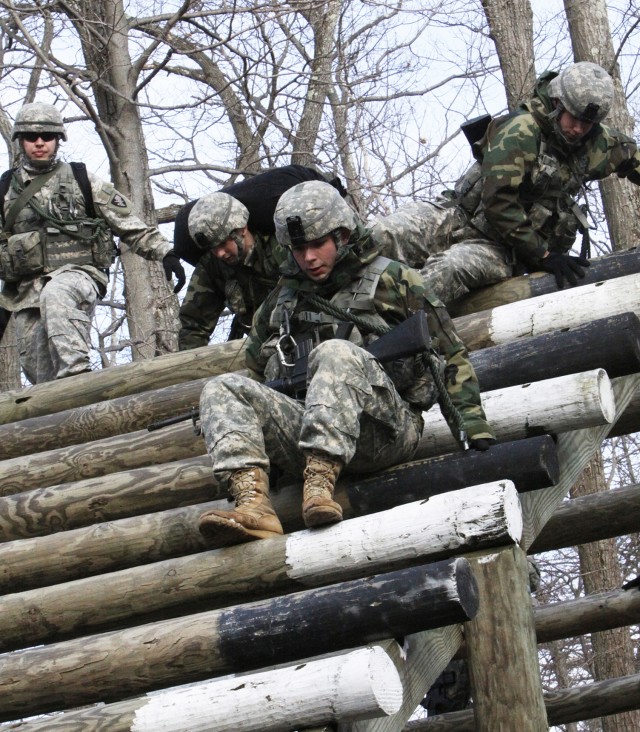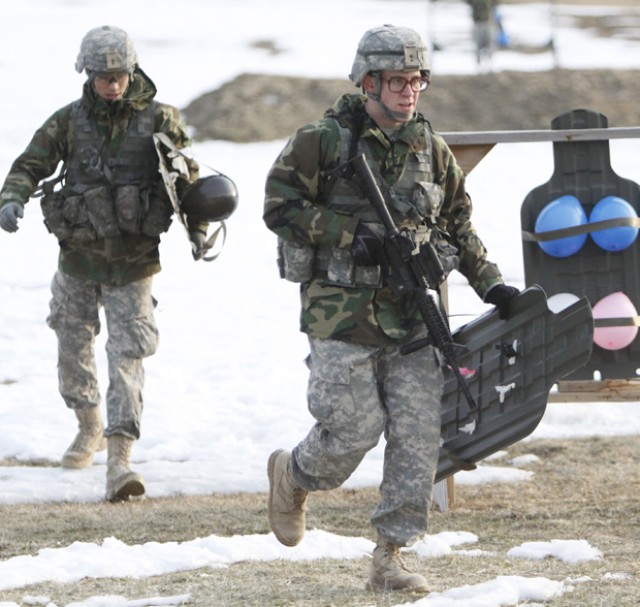WEST POINT, N.Y. (April 8, 2011) -- If it wasn't for Sandhurst, they wouldn't be suited up in full battle rattle running steep inclines throughout West Point every day or climbing in, out and over every obstacle on the courses at Camp Buckner.
If it wasn't for Sandhurst, they wouldn't be trading in sleep for additional marksmanship drills, running extra miles and enduring other specialized training activities.
If it wasn't for Sandhurst, they would probably be less blistered, less exhausted and a little less stressed-if that's even possible for a West Point cadet.
But if it wasn't for Sandhurst, they would never experience the intensely physical and mental rigors of this inter-service, international military skills competition and feel the pride and camaraderie that comes from months of training for this event.
Most cadets, like Class of 2012 Cadet Benjamin Wideman, wouldn't even think of giving up that experience. He's been competing since his first year at the U.S. Military Academy and now Wideman will be leading his C-2 team April 15-16 when West Point hosts the 45th iteration at Camp Buckner.
As the Brigade Sandhurst Officer, Class of 2011 Cadet Michael Vint said every regiment is afforded the same opportunities to train and he tailored a schedule that met the specific requests.
"Some regiments will put the onus on marksmanship as their strategy for where they'll earn the most points," Vint said. "So they request more time on the range then other teams. Others will ask for more time on the obstacle courses."
Wideman's team began tackling the physical demands before winter leave, arranging a "two-a-day" training cycle for physical development. This allowed them to transition to a "maintain" phase in February where they could concentrate on skills training. The ideal end state, Wideman said, is putting forth a team well-conditioned to piling on all the required gear that is still able to move rapidly for the duration of the competition, while maintaining razor-sharp focus to accomplish each task.
During a particularly brutal winter, teams were able to move into the warmer confines of Arvin and other facilities for training. Even marksmanship, thanks to technology like the EST2000, the Army's virtual weapons range, became an indoor activity at the Department of Military Instruction.
Even so, most teams braved subzero temperatures, because, after all, it's an outdoor competition. Wideman's squad went from a single run everyday to morning and afternoon runs, gradually adding layers to their uniforms, adapting to additional weight.
"Even now, sometimes we'll get back into PTs or drop some gear just to take some of the impact off the joints so we don't get any injuries this late in the season," Wideman said.
One team's signature style has been to conduct training soaking wet to mimic the conditions during Sandhurst.
"We just try to jog about a quarter mile whenever we get out of the boat to get used to transitioning out of the water and running with wet boots and legs,"
Class of 2011 Cadet Kenny Friede, the B-4 Sandhurst team leader, said. "Also, I've brought the team down to the Hudson River during a run and had us all wade out into the water and then run back up to the barracks, just to get used to the weight and feeling of having wet legs and boots."
Teamwork strikes at the heart of Sandhurst. Cadets eat at the Cadet Mess as a team, train together and bond for several months to achieve team unity.
"We have a good group and we all get along well," Friede said. "Whenever you spend time with 10 other people every day for six months, there will be some small disagreements, but generally we're all great friends and it's a family environment. Having good times together at meals or going out on weekends is key so that it's not all work when we're together."
Friede described his team as athletic with a wide range of military experience. About half of them competed previously at Sandhurst.
"B-4 has a great Sandhurst tradition," Friede. "We were the best team from the academy for four years running, a streak that broke two years ago. There's a lot of randomness and chance in the competition so no one knows what can happen, but I feel like we have one of the top teams and we can compete with anyone else from USMA. We'll just give it our all on game day and see where it puts us."
With little more than a week until the competition, teams can still be seen loading up in Humvees and heading to the range and obstacle course. Class of 2011 Cadet Ben Jackson, F-1 team leader, recently took his team out to the Anzio course at Camp Buckner.
"OK, what did we do right, what could we do better'" he asks his team.
After each drill, he gathers his team for a quick review.
"Basically, I try to get my guys to think fast, because we're going to be running into scenarios we haven't seen before," Jackson said. "Teams have to be able to think through a scenario, understand the rules for it and execute a plan to accomplish that mission."
He does this on each obstacle, as the team improves their time, improves their motions and improves their thought-processes.
"I'm real proud of these guys," Jackson said. "No one else wakes up as early as they do every day. We have some characters on this team. I'd definitely say we can win this, just because we're so tight and everyone trusts each other."
Jackson is not only confident in his own team, but with all teams representing the Corps of Cadets.
"We've been given a lot more resources and time to train this year, so it's definitely looking good for the Corps overall," Jackson said.




Social Sharing